Post Vilnius NATO Summit it has been all downhill for Zelensky
Glen Johnson VILNIUS/ZELENSKY 14.08.2023
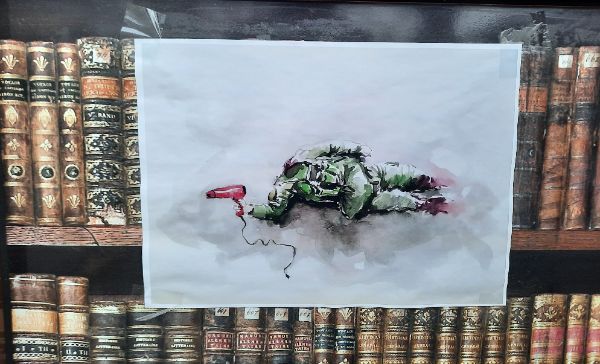
KHARKIV, Ukraine – In the weeks leading up to last month’s NATO summit in Vilnius, Lithuania, the collective West could barely contain its disappointment in Ukraine’s “much anticipated counter-offensive”.
Images of Western military hardware burning on the Pontic-Caspian steppe – trapped in minefields and being picked off at will by Russian artillery, drones and attack helicopters – did little to boost egos in Washington, Brussels and London.
Of course, the collective West knew that Ukraine was in no position to launch its offensive, which began early June. But they were willing to roll the dice with a peripheral state’s manpower, applying significant pressure on Kyiv to assail Russian positions.
“To the last Ukrainian” means just that.
Predictably, Ukrainian President Volodymyr Zelensky was given the short shrift at the July 11-12 summit.
The Ukrainian president had earlier criticized the Alliance for its “vague wording” and lack of “readiness to invite Ukraine to NATO or to make it a member of the Alliance”.
And Zelensky’s remarks were justified: NATO has been stringing Ukraine along since it announced at the famous Bucharest summit in 2008 that the nation, along with Georgia, would join it – a remarkably dumb decision borne on Cold War triumphalism that rode roughshod over Russia’s legitimate security concerns in the Black Sea and paved the way for the current horror in Ukraine.
But Zelensky, accustomed to being fawned over, misread the room: when your deeply unreliable “allies” view your nation as an entirely disposable proxy, results are expected. Not demands and timetables.
The UK defence secretary, Ben Wallace, reportedly said that “whether we like it or not, people want to see a bit of gratitude” from Zelensky, whose army has burned through Western weaponry at mind-boggling rates. “I told them that last year, when I drove 11 hours to be given a list, that I’m not like Amazon.”
US national security advisor, Jake Sullivan, castigated Ukraine: “The United States…has stepped up to provide an enormous amount of capacity to help ensure Ukraine’s brave soldiers have the ammunition, air defence, the infantry, fighting vehicles, the mine-clearing equipment.”
Of course, some of that ammunition now includes cluster munitions, which will exact a devastating civilian toll for years to come.
Dr Strangelove NATO Secretary General Jens Stoltenberg delivered a remarkably jargon-free warning that “…unless Ukraine prevails there is no membership to be discussed at all”.
Ukraine’s purported “NATO aspirations” – only around a quarter of the public, at most, supported joining the Alliance in 2008, with more than 50% opposed – have been a disaster for the country.
Of course, Zelensky quickly came to heel, thanking the West and spinning the summit best he could.
Humiliated and the message (go kill more Russians) well and truly received, Kyiv doubled down on its “much anticipated counter-offensive”, appearing to launch the main thrust of its offensive operations on the Zaporizhzhia front in the latter part of July, while attempting to relitigate the Battle of Bakhmut with assaults on the northern and southern regions of that devastated city.
The fighting has been waged at a near-unfathomable ferocity. The Ukrainians are taking substantial losses, far in excess of the Russian side, which is also bleeding.
On the streets of Dnipro or Kharkiv, it is common to see veterans hobbling along on crutches or nursing other injuries. Three days after Vilnius, The New York Times reported that Kyiv had lost some 30% of the military equipment its “allies” provided for the offensive.
As one special forces soldier, trained in Slovakia, recently said over a beer in Kharkiv while waiting to rotate onto the front near Kupiansk: “We are being used”.
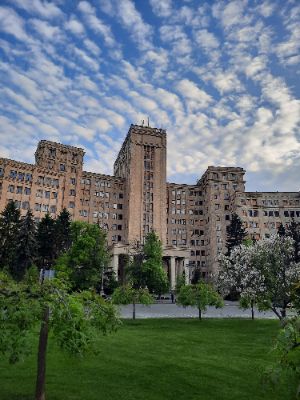
BLOOD AND SOIL
As Zelensky greeted an adoring crowd in Vilnius, The Sydney Morning Herald described him as the “khaki-clad hero of his nation and the Western world”. One hopes that particular reporter at least had a used sock handy while writing that.
But what about those khakis? Zelensky often appears in M-TAC apparel, produced by a company called Militarist. Its slogan is, “Born by Revolution – Hardened by War”. Last year, one of Zelensky’s trademark M-Tac fleeces sold for some £90,000 at a Christie’s auction in London. The company was founded in 2005, selling airsoft products, then expanded into military gear in 2014. During a recent visit to one of its stores in Dnipro, the company’s less than upstanding underpinnings were abundantly clear.
Its selection of patches featured obvious Nazi iconography, including the Black Sun, which adorned the Christchurch shooter’s ballistic vest and is basically a Swastika. The researcher Moss Robeson is worth quoting at length, from his “Ukes, Kooks and Spooks” page on Medium. Writes Robeson:
"Alexander Karasyov is the founder of M-TAC and the owner of its parent company, Militarist. Looking at his social media, it is apparent that Karasyov is a neo-Nazi. The day before Ukraine celebrated 30 years of independence in August 2021, he shared a point of view shot of himself making a Nazi salute at a Ukrainian flag on Facebook. But Karasyov has been most unhinged on the Russian social media platform VK.
“I will also celebrate the day of the Holocaust. Happy holidays to all!” he declared on International Holocaust Remembrance Day in 2017, reacting to an image of Jewish children in a concentration camp. A few months earlier, he shared former Deputy Führer Rudolf Hess’ last words at the Nuremberg trials. In the weeks to come, Karasyov reposted a tribute by Wotanjugend, perhaps the most overt neo-Nazi group in Ukraine, to Horst Wessel, an early Nazi martyr. He also shared a post from “Aryan Hope” wishing a happy birthday to Adolf Hitler, the “best politician in the world, and a wonderful person.”
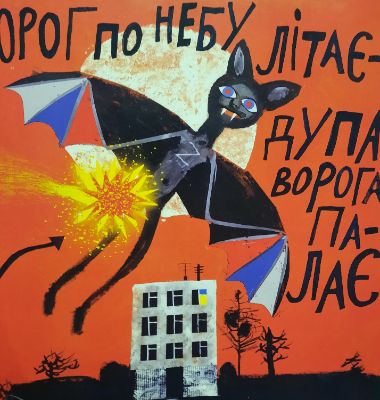
Of course, Zelensky is no Nazi. But he is likely worried about being capped by Ukraine’s powerful far-right. Militarist appears to be close to both the Right Sector and the Azov movement, ultranationalist/ neo-fascist groups. It is not unreasonable to assume he wears M-TAC clothing as a kind of white flag.
Elected in a landslide on a dual peace and (vague) anti-corruption platform, the media entrepreneur has faced significant pushback from political opponents and the country’s nationalist forces, particularly regarding implementation of the Minsk accords via the Steinmeier Formula in 2019, where the radical nationalists headed a “No Capitulation” campaign.
“Mr. President thinks he is immortal,” said lawmaker Sofia Fedyna in a video shared on Facebook as Zelensky confronted Azov Battalion militants in the frontline town of Zolote in October of that year. “A grenade may explode there, by chance. And it would be the nicest if this happened during Moscow’s shelling when someone comes to the frontline wearing a white or blue shirt.”
The head of the Azov Battalion and National Corps, Andriy Biletsky, threatened to flood the town with “thousands” of militants.
The fascist Pravi Sektor co-founder, Dmytro Yarosh, had a few months earlier been more explicit when responding to Zelensky’s inaugural address in which the president said he was, “not afraid to lose my own popularity, my ratings…[I am]prepared to give up my own position, as long as peace arrives.”
“No, he would lose his life,” Yarosh told local media, “He will hang on some tree on Khreshchatyk, if he betrays Ukraine and those people who died in the revolution [sic] and the war.”
Zelensky would capitulate to the ultranationalists, though it is likely that fear was only one of his motivations.
“There was also public opinion and, of course, the media. When you looked at the media landscape in the second half of 2021, he was not popular among a lot of very important talk show people, journalists, anchormen – who were going after him,” said Tarik Cyril Amar, associate professor in history at Koc University in Istanbul and a specialist on Russia and Ukraine. “One of the reasons they were going after him is that they thought he was not hard enough. He constantly had to promise that they would not implement Minsk II. When you watched Ukrainian television at the time, that was very explicitly expressed, all the time.”
Zelensky’s capitulation more-or-less coincided with the arrival of the US President Joe Biden, along with his ridiculous sunglasses and flickering sentience, to the White House.
“I speak today as President of the United States…and I’m sending a clear message to the world: America is back,” said Biden during his first global address at Munich, to a collective global groan. “The transatlantic alliance is back.”
Ukraine was clearly front and center for Biden and the neo-conservatives shaping his Eastern Europe policy.
Regardless, for the Ukrainian radicals it does not matter how much blood seeps into the country’s fertile black soil. Only total “victory” is acceptable, no matter the cost.
The ultranationalist maniacs are so far gone that they have since 2015 been seeking to exhume the remains of Nazi collaborators buried abroad – notably Stepan Bandera, a brutal sadist who led the militant wing of the Organization of Ukrainian Nationalists, and Roman Shukhevich, deputy commander in Hiltler’s Nachtigal battalion – and rebury them in a proposed “Pantheon of Heroes” in an iconic Kyiv park. They recently gathered 25,000 signatures in a petition calling on Zelenksy to implement the project.
Similarly, The Economist recently reported that the authorities in Lviv have been digging up the graves of Soviet soldiers, to make room for this war’s dead. The revisionist wave just took a morbidly disturbing turn.
“Glory to Ukraine”, “Glory to the Heroes”, and “Ukraine above all”.
It is all very 1940s.
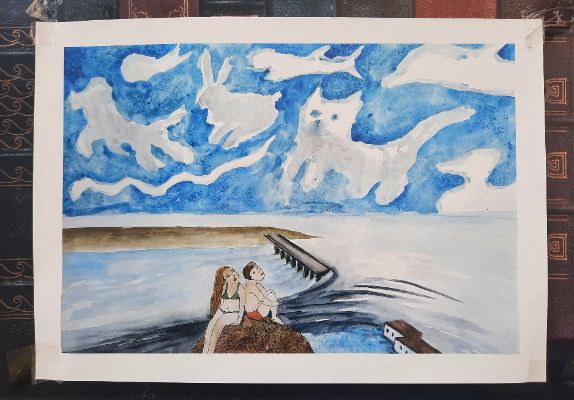
MOTHER OF DRAGONS
The most unyielding voices dominate Ukrainian (and Western) discourse, unsurprising given that opposition media and political parties are banned, and that Russia’s illegal – and entirely provoked – invasion has unleashed much death and destruction.
“[Land for peace] is appeasement…the Russian occupation violated all the rules, they killed thousands, and we are supposed to bow down?” said 35-year-old Lesia, a podcaster from Kyiv. “Trying to make peace with Russia is a symbol of weakness to them.”
As an LGBT rights activist from Kyiv put it: “It is hard for me to be friends with someone who doesn’t think that all Russians deserve to burn in hell and that Russia as a country shouldn’t be erased from this planet.”
Yet, in private, many Ukrainians are much more pragmatic, willing to give diplomacy another chance, or even trade land for peace. But the country is gripped by a stifling free speech environment – rooted in a most toxic form of historical revisionism – making it impossible to accurately gauge public opinion.
While a large majority of Ukrainians express gratitude to Zelenksy for rallying Western support, deep resentment has built up. From the left, he is reviled for his free market zeal. From the nationalist right, he is decried as too “pro-Russian”, whatever that actually means.
“All I can say is that, like many people, I am not proud of Zelensky. I know people at the front and they all say that Zelensky, the government does nothing for them. They need to find all their equipment themselves,” said Iliona, a fitness instructor from Odessa. “[I would exchange Crimea and the Donbass for peace] because I see no other end. Everyone is tired, so many people have died. Nothing is more important than human life.”
Many believe that Zelensky’s administration has been profiting from the war, for which there is ample evidence.
“I voted for Zelensky, but I was left disappointed. He doesn’t rule our country, the mafia and corrupt structures do. And he pretends that he can’t do anything about it,” said Elena (50), from Dnipro. “He should disband his party, which is engaged in bribes and theft. Why doesn’t he listen to our soldiers? He is either a coward or a fool.”
For Valerii (40), also from Odesa and who paid a US$10,000 bribe to leave Ukraine midway through July, settling in Romania, “Zelensky is a prostitute” and the government sends “us to our deaths and doesn’t care”.
“We’re losing so many men. They want me to go to the front. I can’t kill another human being,” said Valerii sat in a Bucharest courtyard. “My friend is fighting. He has killed so many men, he will never recover. Fuck Russia. Fuck our corrupt politicians. Fuck the commissars.”
Ukraine’s military commissars are likely the most hated people in the country now. A most cynical racket has been run by these officials and their foot soldiers, who have used mobilization to brazenly extort military age men.
A profusion of videos spread on social media over the past year: men being hauled from homes or accosted on streets and bundled into vans; others fleeing on foot and, in one instance, being commanded to halt or be shot. Most of these poor souls will get a couple of days “training” – learning patriotic songs – before being sent to plug the front.
“We are dismissing all regional military commissars,” Zelenskyy announced recently. “This system should be run by people who know exactly what war is and why cynicism and bribery at a time of war is high treason.”
Far from being a plucky defender of freedom and democracy, Zelensky is every bit an authoritarian. Even before Russia’s invasion “Zelensky was not a good democrat”, according to Amar, the historian.
“Zelensky, his government and the top of his party were showing very clear authoritarian tendencies before the Russian invasion. That’s something you can trace way back into 2021, at least,” said Amar. “You get things like Zelensky using the former national security council far too sweepingly to do all sorts of things in politics…you get his manipulation of the party landscape, the media landscape.”
This has been put on steroids with martial law in effect.
Former Israeli prime minister, Naftali Bennett – who acted as an intermediary between Kyiv and Moscow at the war’s start – best summed up Zelensky during an interview on his YouTube channel.
“I knew Zelensky was under threat, in a bunker… I said to [Putin], ‘Do you intend to kill Zelensky?’”
“I won’t kill Zelensky.”
“I need to understand. Are you giving me your word that you won’t kill Zelensky?”
“I won’t kill Zelensky.”
Bennett called Zelensky and said: “I’ve just come out of a meeting, [Putin] is not going to kill you.”
“Are you sure?”
“I said, ‘100 percent.’”
Meet Volodymyr Zelenksy, Mother of Dragons and Breaker of Chains, Khaki-Clad Hero of His Nation and the Western World.
“Two hours later Zelensky went and did a selfie in his office [and announced], ‘I’m not afraid.’”
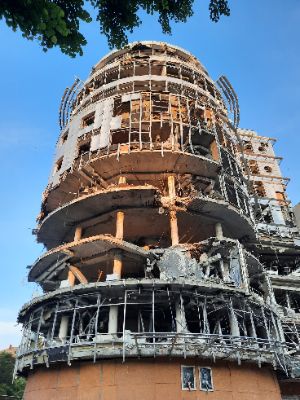
KRAKEN
In the lead-up to Ukraine’s “much anticipated counter-offensive”, Kyiv and Moscow were locked in a kind of staring contest. Both were poised to launch offensive operations. But whoever went first needed to deal a significant blow, given the higher losses associated with offensive operations.
The Ukrainians blinked first, under pressure from their “allies” and a salivating media. And they ran into a brick wall. Kyiv fared somewhat better on the fringes of Bakhmut, advancing on the town of Klischiivka, the lynchpin of Russia’s southern defenses of the city. And they dealt some noticeable blows using sea drones, which Beijing will certainly be interested in. Waves of Kyiv’s aerial drones assailing Moscow carried strong hints of desperation.
Meantime, 100,000 additional, fresh Russian troops have recently deployed to the northern areas of the front, near Kupiansk, replete with 900 tanks. Kyiv recently began evacuating around 30 villages in the region.
Moscow is likely looking to hive off a significant chunk of territory over the remainder of the summer. That does not mean it will succeed. The Russians held Kupiansk for six months last year, marking it a logistics and supply hub for Moscow, which is looking to retake the city with a view to Lyman to the south and Kharkiv just to the west. The Wagner mercenary group have been busy little bees in Belarus and may be preparing to move south. A Russian missile strike on the northern city of Chernihiv on Saturday suggests that an assault may be imminent.
Good luck with taking Kharkiv, if that is the plan: swathes of the population now hate the Kremlin there and Moscow will have to confront the heavily-ideological military intelligence unit, Kraken – which stalled Russia’s Kharkiv advance in the city last year, leaving Russian invaders battered and bloody.
But Ukrainians are also beat down. Death hangs omnipresent over daily life. The kill ratio is likely in excess of two-to-one right now. And not in Ukraine’s favour. Everyone knows the deal: if the true scale of death is revealed, Western publics will quickly grow concerned about their governments’ “support” for Ukraine and calls to bring a negotiated end to the war will mount.
“I didn’t even know [that Russia had deployed 100,000 troops],” said Natalia, 23, a medical student in Kharkiv. “I can’t read the news anymore. Morale is not the best right now.”
Tourette’s
It’s late night in the courtyard of a hostel in Bucharest, mid-August, and the kid is whistling and singing. These peculiar tones interspersed with laughter and cursing, coughing and sniffing, random streams of semi-consciousness. He is in his early twenties. Sometimes he talks to other people, sometimes he talks to himself. Sometimes he talks to other people while talking to himself.
He brings out a green ballistic vest, straps it to his torso. Puts knee pads and tactical gloves on. He makes explosion sounds, then proceeds to do press-ups, while crying out “yeah motherfucker”. He says he has a problem with his family and has not seen them for months. From Romania, he says he is going to fight in Ukraine.
One hopes that he gets nowhere near a frontline.
He did remind me of a video I watched recently of a severely disabled man from Ukraine. He had no place in war. His elderly mother said he had the mental age of a child. He had this stuttering walk. Dazed eyes. And he possessed a thoroughly innocent soul.
He was being called up to service.
Slava Ukraine! Heroiam Slava!
ENDS
Glen Johnson is a New Zealand journalist who has worked as a foreign correspondent for 14 years, predominantly out of the Middle East, North Africa and Eastern Europe. He spent most of the past year in Ukraine.
His work has appeared in The Chicago Tribune, The Los Angeles Times, The New York Times, Vice, The Daily Telegraph, The Guardian, Reuters, Le Monde Diplomatique, Balkan Insight, Al Jazeera, The New Zealand Herald and Metro among others. He first wrote for Scoop while a graduate journalism student at Canterbury University in 2008.


 Ramzy Baroud: The Myth Of Conquest - Why Gaza Will Never Be Subdued By Israel
Ramzy Baroud: The Myth Of Conquest - Why Gaza Will Never Be Subdued By Israel Binoy Kampmark: Fallibility, Dirty Wars And Pope Francis I
Binoy Kampmark: Fallibility, Dirty Wars And Pope Francis I Peter Dunne: Dunne's Weekly - An Issue No-one Can Afford To Lose
Peter Dunne: Dunne's Weekly - An Issue No-one Can Afford To Lose Martin LeFevre - Meditations: Choosing Mass Murder?
Martin LeFevre - Meditations: Choosing Mass Murder? Eugene Doyle: Quiet Mutiny - The U.S. Army Falls Apart
Eugene Doyle: Quiet Mutiny - The U.S. Army Falls Apart Gordon Campbell: Papal Picks, And India As A Defence Ally
Gordon Campbell: Papal Picks, And India As A Defence Ally